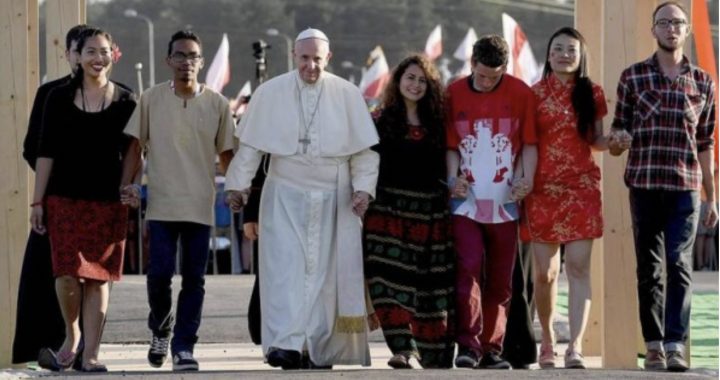Prayer, social media, hospitality, events are some of the many tools in our toolkit
In my previous post, Top 10 Catholic excuses for not evangelizing, I left the 10th excuse, “I don’t know how to evangelise” unanswered because it deserves a response that requires a full-length article. So here it is in 10 points.
How you can develop an evangelistic mindset
1. Pray for the salvation of souls, and not just for world peace, health, employment, or salvation upon death (Purgatory is not a second chance to get to Heaven. If a person ignores God on earth, there is not much hope), etc. Believe that God desires all men to be saved (1 Tim 2:4), so storm heaven for the miraculous conversion of people such as ISIS, Zakir Naik and others. Some find it helpful to list 10 non-Christian friends and pray for them on a decade of the Divine Mercy. Can anything withstand the onslaught of a praying Church?
2. Offer to pray for people in need. Pope Francis suggests ending conversations “with a brief prayer related to the concerns, which the person may have expressed” (Evangelii Gaudium 128). Show them that you genuinely care for their concerns and pray with simple words (formal prayers may mean a lot to Catholics but may come across as mechanical to the uninitiated). For example, after my personal trainer shared that he had concerns about hitting his target, I told him I will be praying for this intention. Recently, a lady had car trouble in church. We tried to help as best as we could but she was clearly traumatised. So, I asked the aunty if she would like us to pray for her. And we did.
3. Share your faith in a natural way on social media. Young people are less on Facebook and more on Instagram. Make your message interesting, clear and Christ-centred. We can do better than “Happy holidays!”, “Compliments of the Season!” or even “Christmas is a season of joy, gift-giving and of families united”. If it’s Christmas, the main celebration is not Santa Claus, Rudolph, snow or mistletoe, but the Christian belief that God became man. Say something about that!
4. Welcome and invite your non-Christian friends to a corporal work of mercy. I serve at a soup kitchen and I’ll just invite my friends to join me in a very natural way. But too often, our evangelization stops there. Serving the poor offers a natural opportunity for us to discuss the meaning of life. I would also invite them for drinks or a meal after serving where we can have spiritual conversations.
5. Initiate conversations with interesting questions like, “What do you think is the purpose of life?”, “If you could meet God today, what would you ask him?”, “How do you decide what is right or wrong?”, “What is your view of God/Jesus Christ/Catholic Church?” and so on. As the conversation progresses, it may be very natural to invite them further to an Alpha (There are chapters in most countries), a prayer meeting, Mass or even RCIA!
6. Be prepared to give an explanation for your faith (1 Pet 3:15). This includes a clear and simple story of how your life has been changed by Christ. Be ready also to share an answer to the question, “So what does Christianity teach?” You can find an example of a Catholic presentation of the Gospel, also known as the kerygma, at Sharing the Gospel.

7. Welcome and invite your non-Christian friends to a church event. Include them in religious celebrations like Christmas and Easter (if you are taking them to Mass, be ready to explain the essentials of the rituals or the festivities so that they can appreciate it and follow along as much as they may feel comfortable). If your parish or one nearby is running an Alpha, invite him along.
8. Raise parish hospitality levels. Resist the temptation to create religious cubby holes and cliques with other committed Catholics. “In all its activities, the parish encourages and trains its members to be evangelisers” (Joy of the Gospel 28). In whatever parish ministry you are involved in, be creative on how it can welcome non-believers. For example, for the Parish Family Day, instead of giving bonus points for participants from the same Basic Ecclesial Community (Neighbourhood Christian Community in Singapore), give bonus points instead for inviting non-Christian friends. The Hospitality Team should do more than show people to their seats. Be ready to start conversations, especially with visitors, even inviting them to a meal!
9. Join the Catechetical team that prepares young people for the Sacrament of Confirmation or learn how to be an effective Godparent/sponsor. At 16 years old, the curious-minded are seeking answers to their questions and doubts. Invite them into a relationship with the Lord and train Confirmands with the goal of helping them to become evangelisers.
10. Connect with other missionary-minded Catholics. As hot coals that burn together, hold each other accountable and inspire everyone to persevere in evangelising.
You might even want to form an evangelistic apostolate. Many Catholics are unaware or have forgotten that by the Sacrament of Confirmation, they are “obliged more firmly to be witnesses of Christ by word and deed and to spread and defend the faith” (Canon Law 879). Build conviction and urgency for evangelism, which is the “why”, and coach others in the skills and practice of evangelism, the “how”. Catholics need to understand atonement and salvation. The biggest stumbling block to evangelism is that Catholics cannot explain what happened on Good Friday and are practical religious relativists.
There are very many people eager to engage in spiritual conversations if only there were Catholics who would generously talk to them: the Mormons, the Jehovah’s Witnesses and most recently the Korean World Mission Society Church of God. Get their numbers and call them out for a conversation!
Main Image: Raffaello Sanzio da Urbino’s St. Paul preaching at Athens




